If you have lost one or more of your original pearly whites, here are five important facts you should know about dental implants and why it is they are regarded by many as the best the dental industry has to offer!
 # 1 New teeth implants are the only dental devices that replace the crowns AND the roots of the missing tooth or teeth. Both tooth-supported bridges, partials and removable dentures only replace the visible portion of the missing teeth and this can be problematic in the long run.
# 1 New teeth implants are the only dental devices that replace the crowns AND the roots of the missing tooth or teeth. Both tooth-supported bridges, partials and removable dentures only replace the visible portion of the missing teeth and this can be problematic in the long run.
“The roots of your teeth play a fundamental role in keeping the underlying bone tissue stimulated and healthy. So when this functional stimulation is taken away, the jawbone can begin to atrophy and waste away, which can have terrible consequences for a person’s overall oral health, facial appearance and candidacy for implants,” explains a dental implants surgeon in Rutherford. “This is one of many reasons we encourage patients to consider implants.”
# 2 New teeth implants are often regarded as being prohibitively expensive, when in fact, if you compared the cost of this once-time procedure to the accumulative expenses associated with wearing removable dentures, maintaining them and undergoing periodic re-fittings (as is necessary with dentures), then you’d end up with pretty much the same amount of money!
“Patients who wear removable dentures often need to invest in products such as anesthetic creams for sore gums, adhesives to prevent their teeth from slipping and soaking solutions to store their dentures in overnight,” explains a dental implants surgeon in Rutherford. “Add these repeat expenses to the need to have ill-fitting dentures redone every few years and you’re looking at a teeth replacement technology that is deceptively expensive and frankly, poor value for money.”
# 3 New teeth implants are regarded as the best option available for most people who need one, several or even all of their teeth replaced, but they cannot rival the function and longevity of your biological technology: your own natural teeth. This is why your dentist always stresses the importance of good oral hygiene, a healthy diet and regular dental check-ups and professional cleanings.
 # 4 Dental implants are made from titanium metal, which is the same stuff space crafts are made out of! Professional sports equipment and fighter jets are also made out of titanium, which is so useful because of its exceptional strength, durability, lightweight, non-corrodibility and non-toxicity. Additionally – and perhaps most importantly – titanium is bio-compatible, which means that the body does not typically reject it. It’s this property that allows the jawbone to heal around the new tooth implant, fixing it in place so that it functions like a natural tooth root.
# 4 Dental implants are made from titanium metal, which is the same stuff space crafts are made out of! Professional sports equipment and fighter jets are also made out of titanium, which is so useful because of its exceptional strength, durability, lightweight, non-corrodibility and non-toxicity. Additionally – and perhaps most importantly – titanium is bio-compatible, which means that the body does not typically reject it. It’s this property that allows the jawbone to heal around the new tooth implant, fixing it in place so that it functions like a natural tooth root.
# 5 If placed by an experienced oral surgeon and cared for properly by the patient – who is presumably in good general and oral health – new teeth implants have the potential to last several decades without any trouble. In fact, they have the potential to last a lifetime!
 1. The All-on-4, as the name suggests, only requires four dental implants to provide New Jersey residents with a complete set of replacement teeth. Traditional techniques could require six, eight or even ten implants per jaw in order to give patients new teeth again! Half the number of implants translates into half the cost of new teeth.
1. The All-on-4, as the name suggests, only requires four dental implants to provide New Jersey residents with a complete set of replacement teeth. Traditional techniques could require six, eight or even ten implants per jaw in order to give patients new teeth again! Half the number of implants translates into half the cost of new teeth. 4. With only one surgery and one day out of commission, the All-on-4 also allows for indirect savings on the cost of new teeth implants. Patients spend much less time in recovery, which means that they can spend more time being productive and at work.
4. With only one surgery and one day out of commission, the All-on-4 also allows for indirect savings on the cost of new teeth implants. Patients spend much less time in recovery, which means that they can spend more time being productive and at work. "Dental veneers are wonderful cosmetic restorations that can make it look like you have new teeth," says the New Jersey dental implants surgeon. "The concept is the same as covering a battered, stained table with a beautiful table cloth. Veneers are ultra-thin shells of ceramic material that are custom-made to fit over the outer surface of a tooth. The tooth surface is typically prepared by being slightly ground down or reduced, so that there is space to accommodate the thickness of the veneer. The veneer is then cemented in place, effectively covering up the appearance of surface and deep stains and any imperfections in the actual tooth structure, including chips, cracks, and erosion."
"Dental veneers are wonderful cosmetic restorations that can make it look like you have new teeth," says the New Jersey dental implants surgeon. "The concept is the same as covering a battered, stained table with a beautiful table cloth. Veneers are ultra-thin shells of ceramic material that are custom-made to fit over the outer surface of a tooth. The tooth surface is typically prepared by being slightly ground down or reduced, so that there is space to accommodate the thickness of the veneer. The veneer is then cemented in place, effectively covering up the appearance of surface and deep stains and any imperfections in the actual tooth structure, including chips, cracks, and erosion." "The last measure that can be taken to restore a damaged and/or decayed tooth is a dental crown, with or without root canal therapy depending upon the recommendations of your dentist," says the dental implants surgeon in New Jersey. "Dental crowns are used to replace the visible portion of teeth that have become so damaged or decayed that a significant portion of it needs to be removed. The crown is custom made to fit the remaining tooth and resume its appearance and function."
"The last measure that can be taken to restore a damaged and/or decayed tooth is a dental crown, with or without root canal therapy depending upon the recommendations of your dentist," says the dental implants surgeon in New Jersey. "Dental crowns are used to replace the visible portion of teeth that have become so damaged or decayed that a significant portion of it needs to be removed. The crown is custom made to fit the remaining tooth and resume its appearance and function." Smiling is a fundamental tool for human communication, so if your teeth are preventing you from doing it with confidence, it’s time to learn about what can be done to improve your situation. You don’t necessarily need to get new teeth! Here’s what a Rutherford dental implants surgeon has to say about getting back a confident smile!
Smiling is a fundamental tool for human communication, so if your teeth are preventing you from doing it with confidence, it’s time to learn about what can be done to improve your situation. You don’t necessarily need to get new teeth! Here’s what a Rutherford dental implants surgeon has to say about getting back a confident smile! “If your teeth are essentially healthy, but still appear an unattractive yellow it’s most likely that they have become stained or discolored through repeated exposure to the tannins and dyes in the foods and beverages you consume. Coffee, tea, dark berries, sodas or anything with dark pigmentation can cause your teeth to become permanently stained,” explains the Rutherford dental implants surgeon.
“If your teeth are essentially healthy, but still appear an unattractive yellow it’s most likely that they have become stained or discolored through repeated exposure to the tannins and dyes in the foods and beverages you consume. Coffee, tea, dark berries, sodas or anything with dark pigmentation can cause your teeth to become permanently stained,” explains the Rutherford dental implants surgeon. "Perhaps second only to gum disease, an oral surgeon’s most common patients are those who have sustained trauma to the face and mouth,” say dental implants surgeons in Rutherford. “Contact sports, extreme sports and recreational activities, such as bicycling and skateboarding, are frequently the cause of facial injuries that can lead to the irreparable damage of teeth.”
"Perhaps second only to gum disease, an oral surgeon’s most common patients are those who have sustained trauma to the face and mouth,” say dental implants surgeons in Rutherford. “Contact sports, extreme sports and recreational activities, such as bicycling and skateboarding, are frequently the cause of facial injuries that can lead to the irreparable damage of teeth.” 3. Custom-fitted mouth guards are the best yet. They are custom made in a dentist’s office from molds or impressions that have been taken of your teeth. “Custom mouth guards may be more costly than store-bought protectors, but they offer superior protection and are far more comfortable,” say dental implants surgeons in Rutherford. “Most professional sports players invest in these.”
3. Custom-fitted mouth guards are the best yet. They are custom made in a dentist’s office from molds or impressions that have been taken of your teeth. “Custom mouth guards may be more costly than store-bought protectors, but they offer superior protection and are far more comfortable,” say dental implants surgeons in Rutherford. “Most professional sports players invest in these.”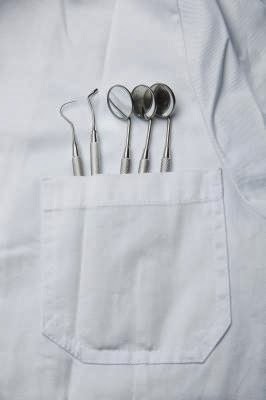 “The length of recovery and the degree to which it is recommended that you keep your feet up depends heavily upon the nature of the procedure you’ve just undergone,” explain the NJ dental implants surgeons. “For example, if your child has had a decayed primary or baby tooth removed, typically recovery is quick and with minimal discomfort, save perhaps for a little treat to reward them for their bravery. If you’ve had an adult decayed tooth extracted, you may want to avoid certain strenuous activities and tough foods for 24 to 48 hours to prevent bleeding.”
“The length of recovery and the degree to which it is recommended that you keep your feet up depends heavily upon the nature of the procedure you’ve just undergone,” explain the NJ dental implants surgeons. “For example, if your child has had a decayed primary or baby tooth removed, typically recovery is quick and with minimal discomfort, save perhaps for a little treat to reward them for their bravery. If you’ve had an adult decayed tooth extracted, you may want to avoid certain strenuous activities and tough foods for 24 to 48 hours to prevent bleeding.”
 “Before we even pick up a tool, we rub a topical anesthetic cream onto the gums where we intend to inject the numbing medication. The former prevents the latter from being painful and the latter prevents the procedure from being painful,” explains the dentist in New Jersey. “This way, patients typically have absolutely nothing to be afraid of… not even the needle used to administer anesthetic.”
“Before we even pick up a tool, we rub a topical anesthetic cream onto the gums where we intend to inject the numbing medication. The former prevents the latter from being painful and the latter prevents the procedure from being painful,” explains the dentist in New Jersey. “This way, patients typically have absolutely nothing to be afraid of… not even the needle used to administer anesthetic.”
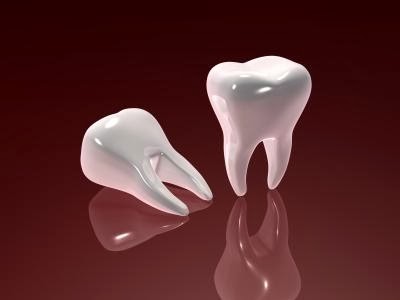 What this idiom fails to elucidate is the fact that the modern procedures and techniques used to extract teeth nowadays are really no longer painful. In fact, dental extractions are in most cases one of the quickest, simplest and least painful of all the surgical procedures.
What this idiom fails to elucidate is the fact that the modern procedures and techniques used to extract teeth nowadays are really no longer painful. In fact, dental extractions are in most cases one of the quickest, simplest and least painful of all the surgical procedures.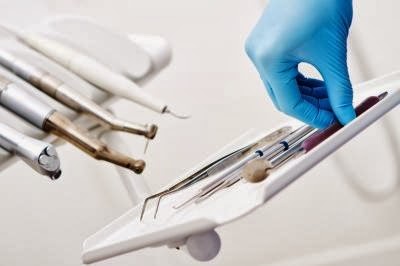 “No quality dentist would remove a patient’s natural tooth without first being certain that there is nothing else that can be done to save it. You see, while dental implants (and the restorations they support) offer New Jersey residents a very sophisticated, functional and aesthetic solution to missing teeth, nothing on the market can rival your own biological technology.
“No quality dentist would remove a patient’s natural tooth without first being certain that there is nothing else that can be done to save it. You see, while dental implants (and the restorations they support) offer New Jersey residents a very sophisticated, functional and aesthetic solution to missing teeth, nothing on the market can rival your own biological technology.  Traditional dental implant procedures could require as many as 10 implants per jaw in order to give patients a full set of new teeth again. The All-On-4®, as the name suggests, only requires four (see image below).
Traditional dental implant procedures could require as many as 10 implants per jaw in order to give patients a full set of new teeth again. The All-On-4®, as the name suggests, only requires four (see image below). Where many thousands of dollars are saved, however, is by the All-On-4’s ability to avoid the need for bone grafting surgery, which is highly invasive, painful and expensive. As stated, older dental implant protocols would frequently require more implants (so they thought) and hence bone grafting was often performed before a dental implant professional could even begin oral rehabilitation for a NJ patient.
Where many thousands of dollars are saved, however, is by the All-On-4’s ability to avoid the need for bone grafting surgery, which is highly invasive, painful and expensive. As stated, older dental implant protocols would frequently require more implants (so they thought) and hence bone grafting was often performed before a dental implant professional could even begin oral rehabilitation for a NJ patient.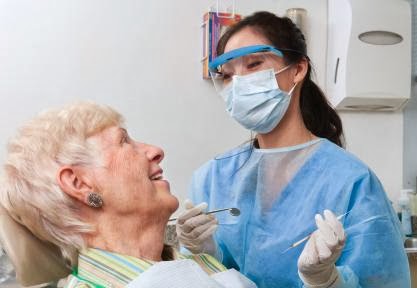 There are many approaches dentists can take to treating gum disease before they will consider giving New Jersey residents new teeth. Often a combination is used depending upon the extent of the disease and the damage it has already done. The first phase of treatment would be a thorough oral health assessment, followed by the recommendation of one or more of the following:
There are many approaches dentists can take to treating gum disease before they will consider giving New Jersey residents new teeth. Often a combination is used depending upon the extent of the disease and the damage it has already done. The first phase of treatment would be a thorough oral health assessment, followed by the recommendation of one or more of the following: Thankfully, if you have lost one or more of your teeth to gum disease, there is a suite of teeth replacement techniques available to help give you your smile back. Dental implants are typically the most highly recommended of these options because of their durability and better function and aesthetics.
Thankfully, if you have lost one or more of your teeth to gum disease, there is a suite of teeth replacement techniques available to help give you your smile back. Dental implants are typically the most highly recommended of these options because of their durability and better function and aesthetics.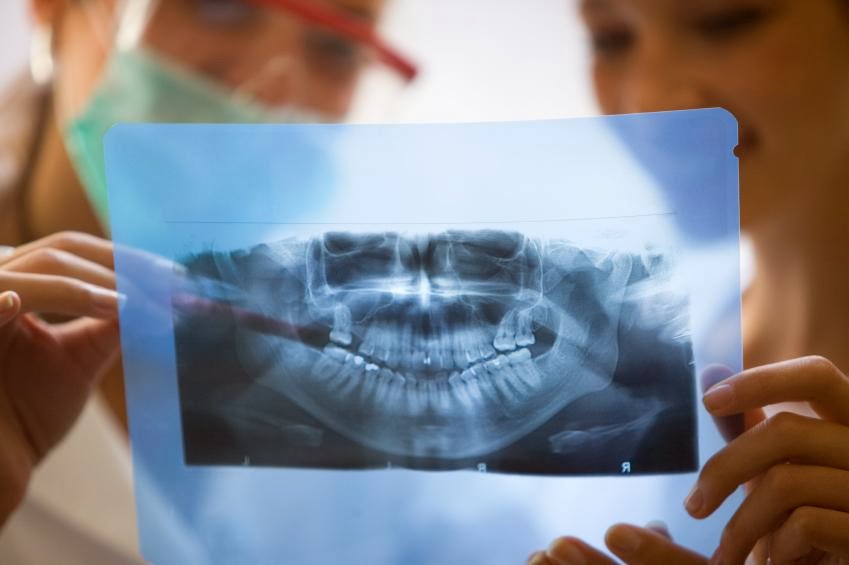 In the beginning stages, gum disease is known as gingivitis and can present with one or more of the following symptoms:
In the beginning stages, gum disease is known as gingivitis and can present with one or more of the following symptoms:
 Periodontal or gum disease is an advanced bacterial infection of the gums and the supporting structures of the teeth. It is caused by a lack of proper at-home and professional oral hygiene and comes hand-in-hand with risk factors such as:
Periodontal or gum disease is an advanced bacterial infection of the gums and the supporting structures of the teeth. It is caused by a lack of proper at-home and professional oral hygiene and comes hand-in-hand with risk factors such as: 
 Tobacco use is one of the leading causes of gum disease and gum disease is the leading cause of tooth loss. Smoking also compromises the ability of patients to fight off infection and heal after dental work is done, so your best chance of keeping all of your natural teeth is to kick the habit!
Tobacco use is one of the leading causes of gum disease and gum disease is the leading cause of tooth loss. Smoking also compromises the ability of patients to fight off infection and heal after dental work is done, so your best chance of keeping all of your natural teeth is to kick the habit! “Heavy drinking and drug abuse take as heavy a toll on the health of your teeth and gums as they do on your body,” explains a dental implants professional in New York. “Alcoholic beverages are almost always full of sugar and/or acid, which wears away at the dental enamel protecting your teeth. Alcohol also causes a condition known as ‘dry mouth’, which impedes the natural production of saliva. Saliva is a natural anti-bacterial, so people with frequent dry mouth tend to be more susceptible to tooth decay and gum disease. There are even some prescription medications that cause this condition so be sure to speak to your doctor about dosage or even a substitute if you experience this side effect.”
“Heavy drinking and drug abuse take as heavy a toll on the health of your teeth and gums as they do on your body,” explains a dental implants professional in New York. “Alcoholic beverages are almost always full of sugar and/or acid, which wears away at the dental enamel protecting your teeth. Alcohol also causes a condition known as ‘dry mouth’, which impedes the natural production of saliva. Saliva is a natural anti-bacterial, so people with frequent dry mouth tend to be more susceptible to tooth decay and gum disease. There are even some prescription medications that cause this condition so be sure to speak to your doctor about dosage or even a substitute if you experience this side effect.”